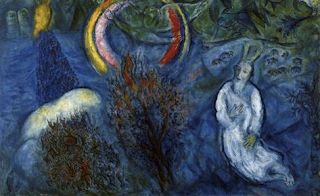Hear while I tell
about the best of dreams
Which came to me
the middle of one night
While humankind
were sleeping in their beds.
It was as though I
saw a wondrous tree
Towering in the
sky suffused with light,
Brightest of
beams; and all that beacon was
Covered with
gold. The corners of the earth
Gleamed with fair
jewels, just as there were five
Upon the
cross-beam. Many bands of angels,
Fair throughout
all eternity, looked on.
No felon's gallows
that, but holy spirits,
Mankind, and all
this marvellous creation,
Gazed on the
glorious tree of victory.
And I with sins
was stained, wounded with guilt.
I saw the tree of
glory brightly shine
In gorgeous
clothing, all bedecked with gold.
The Ruler's tree
was worthily adorned
With gems; yet I
could see beyond that gold
The ancient strife
of wretched me, when first
Upon its right
side it began to bleed. [...]
The Dream of the Rood is a poem dating back to at least the 8th century. In it, the narrator dreams of a tree encrusted with stones, upon which, he realizes, is the blood of Christ. In the second part of the poem, the Crucifixion story is told from the perspective of the Cross; later, the poet reflects on all that he has seen. To continue reading Richard Hamer's translation of this poem from Old English, click here.
Image source
Text source (trans. R. Hamer)





